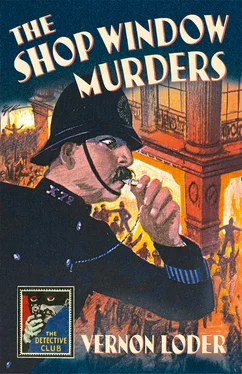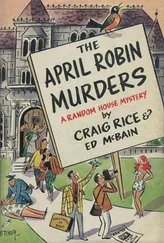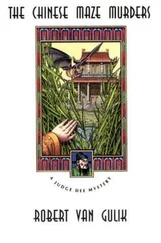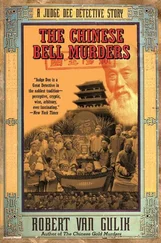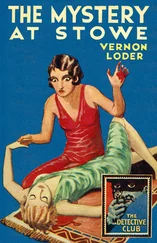He went away, to return again in a minute, and raise a hand to command silence. It may have been the noises from the Store, but he could hear nothing of the moving of the lift, and realised that the experiment could not be made until the place was empty and perfectly quiet.
Explaining this to the watchman, he went off, and found himself in a couple of minutes in the shop window with the blind down, talking to his superintendent, who had just arrived from the Yard, and the surgeon, who sat smoking a cigarette, and watching the last efforts of the lower ranks, as they measured and surveyed and plotted the big space. When he had finished explaining what he had done, Devenish was rewarded by a nod of approval from the superintendent.
‘Any sign of the bullet yet, sir?’ he asked.
‘None at all,’ said the big man stolidly. ‘High-velocity bullet, Dr Grindley thinks.’
‘ Knows ,’ said the surgeon, puffing. ‘I saw enough of them during the war. Steel-jacketed, I should say.’
‘Not that Mauser?’ asked Devenish gently.
‘I ought to have been a gunner,’ said the surgeon, smiling. ‘I know all about ’em—all kinds. That Mauser is new, been fired once. But I think your experts will agree that it was fired with blank. I won’t swear, but that is my opinion.’
‘Possible,’ murmured Devenish. ‘A man who would take the trouble to set up his victims as specimens in the window here wouldn’t leave the gun on view.’
‘Was the shot fired at close quarters?’ said the superintendent.
‘I should say not. Not very close anyway.’
‘How long should you say he had been dead?’
The surgeon reflected. ‘It isn’t so easy to answer that as some people imagine. I should say roughly between twelve to fourteen hours, but I may be sadly out.’
‘And the young woman?’
‘Less, I should say, but I can’t tell you how much less. In neither case does the bleeding seem to have been extensive—a sporting bullet with a more or less soft nose would have been different. The other wound was made by a weapon that did not—’
‘Wait a moment,’ said Devenish. ‘If she was killed after him—’
‘Then he didn’t do it,’ said the surgeon. ‘I admit that! I don’t think either of them did it to each other!’
Devenish smiled faintly. ‘Well, you’ll have the P.M., and then we shall know more. I thought, superintendent, of going to see the man in charge of the aeroplane department. I see you have cleared most of the people out of the Store, but the executives will be here.’
‘I asked them to stay in Mr Mander’s private office,’ said the other. ‘I am going to have a talk to them. But if you care to see one alone—’
‘If he would come to me in his department above, sir,’ said the inspector, ‘I will go there now.’
The superintendent nodded. ‘Very well. I’ll send him.’
The inspector nodded to the surgeon, and went away. Taking one of the automatic lifts, which had upon a board outside ‘To Sporting and Aeroplane Departments’, he found himself on the first floor, and presently arrived in an immense room looking over a street at the side of the Stores building. Housed in this department (some ready for flight, and some in the various stages of folding that made the Mander Hopper such a boon to the private pilot without a hangar) were about six machines.
Devenish lit a cigarette, and walked round them thoughtfully until the sound of someone approaching told him that the manager of the department was arriving for his interview. He came in, and greeted the detective briefly. Devenish saw that he was an alert and handsome young man of about thirty, rather of a military cut, and obviously intelligent.
‘I was up on the roof just now, sir,’ the detective told him. ‘There were tracks that made me rather wonder if a machine had landed there lately.’
‘This is a pretty filthy business, inspector,’ said Mr Cane in reply. ‘Hardly bargained for a Wild-West shooting here. But what was that you said? A machine landed on the roof? Most unlikely, I should say. We had enough of that sort of thing a month ago.’
‘A certain amount of trouble, but also a good deal of advertisement, sir! I should like to have a list of purchasers of the “Mander Hopper”.
‘The first purchasers. But suppose they had been resold?’
‘No doubt we could trace them, said Devenish, offering his case to the young man, who took a cigarette and lit up.
‘I suppose you could. I’ll get you a list.’
‘Are these heavy machines?’
‘Yes, they are heavier than machines would be which were not fitted with the gyrocopter device, inspector.’
Devenish approached a machine which was ready for flight. ‘The tyres on the landing wheels are naturally wider when the machine rests on them than when they are removed,’ he said.
Cane grinned. ‘That is what “Punch” would call “another glimpse of the obvious”, inspector. I might even go further, and suggest that, at the moment when a machine lands, the impact makes the track even wider than that!’
‘Quite what I thought, sir,’ replied Devenish innocently. ‘Now could we get one of the wheels to make some sort of track here?’
Cane thought it over. ‘I might chalk the treads of the two tyres, and we could push the ’bus a bit along the floor, if that is any good to you.’
‘Splendid, sir. While you are doing that, I might be looking at your books, and taking down some of the names of purchasers of these machines.’
‘Come to my office in the corner there. You’ll find pens and paper, while I get the books out of the safe.’
There had been perhaps fifty purchasers of the ‘Mander Hopper’ since it had been put on the market, or rather, there had been promise of delivery of that number of machines. Devenish took down the names and addresses, and had completed his list when Cane called to him.
‘Palaver set, inspector.’
Between them, they pushed a machine along the floor, and the inspector not only measured the whitened track made by the tyres, but also the width of the treads pressed out by the weight above.
‘That will do nicely, sir,’ he said when he had finished. ‘Now I want to ask you a question about Mr Mander. He was interested in machines and aerodynamics, wasn’t he? I saw some sort of a laboratory, or workshop, above.’
Cane laughed a little. ‘He did tinker a bit, I believe; but I really know nothing about it. He said he always gave full charge of a department to a man, and never interfered.’
‘But who invented the machine here that is called by his name?’
‘It is assumed that he did.’
‘Well, didn’t he?’
‘Can’t say. He patented it, I know. I was only once up in his workshop, and he didn’t like that much. What I saw there of the jobs he did struck me as elementary. A fellow who invented this had to be a swell at other things than mechanics.’
Devenish’s eyes lit up. ‘You mean that he did not seem to you capable enough?’
Cane nodded. ‘I mean that, when I had to talk to customers once or twice before him, he never said a word. Can you imagine any chap who could invent a perfect gyrocopter standing mum while you were fiddling with his subject? I can’t! I know inventors. Perfect pests, poor devils, and ready to jaw your head off! That is about the only satisfaction they get out of their inventions.’
‘But someone must have invented it?’
‘Obvious again. But isn’t there just a hint that the man who did might have been on his uppers, and beam-ends, and so on, and been told he could get a purchaser if he kept his mouth shut?’
‘Ah!’ said Devenish heavily.
Then he thanked Cane for his help, and left him to go on the roof again, where he made fresh measurements and comparisons, emerging half an hour later, and going towards the lift, when he met a man he had not seen before, a pompous stout man, with a bald head, who introduced himself as the assistant-manager.
Читать дальше
